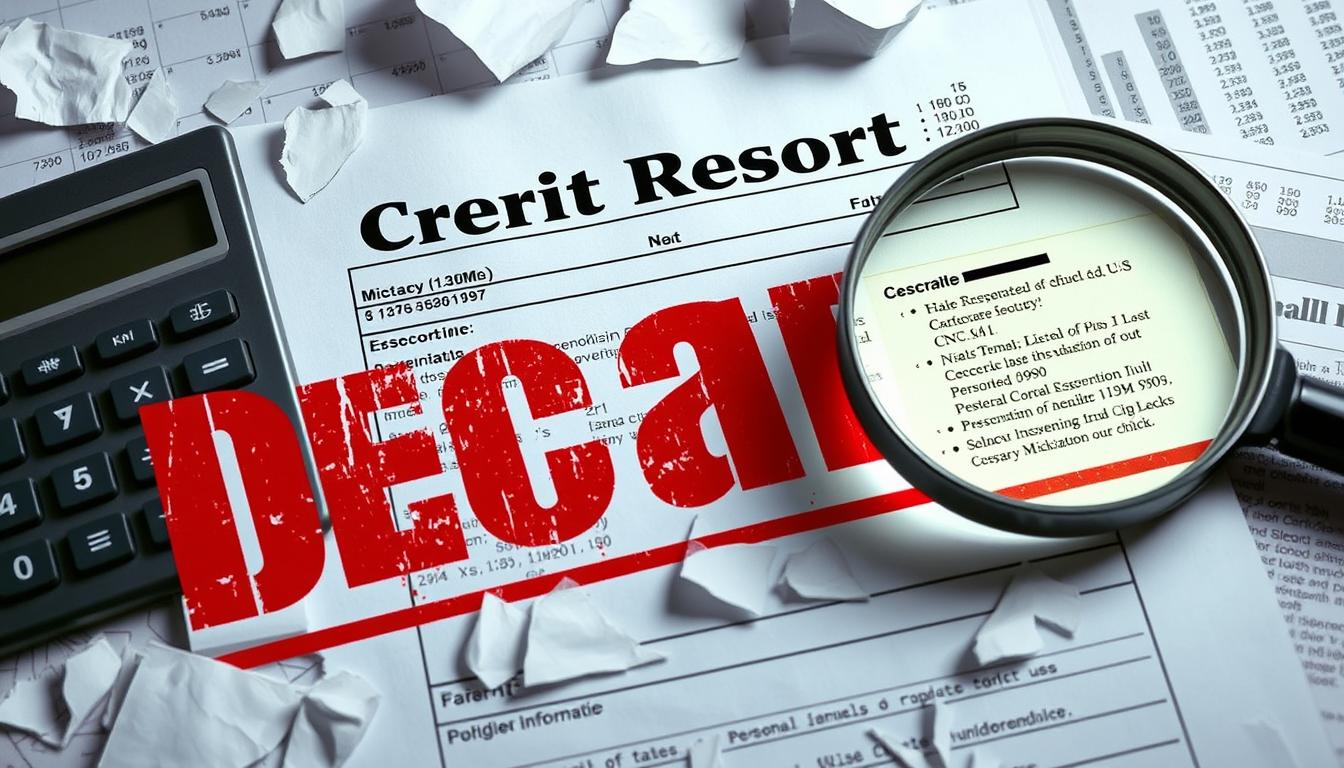Credit reports play a crucial role in our financial lives. Inaccuracies in these reports can cause significant problems. If you find errors in your Equifax credit report, you might consider legal action.
This article will explore your options for dealing with incorrect information. We’ll guide you through understanding your rights and seeking potential compensation.
Key Takeaways
- Understand the common types of credit report errors and their impact on your financial standing.
- Learn about the legal grounds for suing Equifax for providing inaccurate information.
- Discover the potential damages and compensation you may be entitled to if you successfully sue Equifax.
- Familiarize yourself with your rights under the Fair Credit Reporting Act (FCRA) and the steps to dispute errors with Equifax.
- Explore the importance of building a strong case and choosing the right legal representation to maximize your chances of success.
Understanding Credit Report Errors
Your credit report greatly affects your financial health. Sadly, these reports can contain mistakes. Such errors may lower your credit score and cause various problems.
Inaccuracies can lead to loan rejections and identity theft. It’s vital to check your report regularly for any mistakes.
Common Inaccuracies and Their Impact
Credit reports may show wrong personal details like name or birth date. They might also list incorrect account info or non-existent accounts.
These credit report errors can harm your credit score. This makes getting good interest rates or qualifying for loans harder.
Consequences of Incorrect Credit Information
Inaccurate credit information can cause widespread issues. A low credit score may hinder renting an apartment or getting a job.
Sometimes, credit reporting agencies fail to address identity theft. This can lead to serious financial and legal troubles.
| Type of Credit Report Error | Potential Impact |
|---|---|
| Incorrect personal information | Lower credit score, difficulty obtaining credit |
| Incorrect account details | Lower credit score, difficulty obtaining credit |
| Fraudulent accounts | Lower credit score, identity theft, legal complications |
| Outdated information | Lower credit score, difficulty obtaining credit |

Check your credit report often and fix any credit report errors quickly. This helps protect your financial health.
Taking action ensures your report accurately shows your financial history. It also helps maintain a healthy credit profile.
The Role of Credit Reporting Agencies
Credit reporting agencies collect and share consumer credit information. Equifax, Experian, and TransUnion are key players in this field. Their data impacts consumers’ creditworthiness and financial opportunities.
The Fair Credit Reporting Act (FCRA) governs these agencies. It sets out their obligations to consumers. Understanding their role is crucial for managing your credit information.
Responsibilities of Credit Reporting Agencies
- Collecting and compiling consumer credit data from various sources, including lenders, creditors, and public records
- Maintaining accurate and up-to-date credit reports for each consumer
- Providing credit reports to authorized parties, such as lenders, employers, and landlords, upon request
- Investigating and resolving disputes related to credit report inaccuracies or errors
- Ensuring compliance with the FCRA and protecting consumer rights
Importance of Accurate Credit Reporting
Credit reports greatly influence loan approvals, credit cards, housing, and job prospects. Errors in these reports can lead to FCRA violations. These mistakes may result in higher interest rates or loan denials.
| Credit Reporting Agency | Percentage of Error-Containing Credit Reports |
|---|---|
| Equifax | 21% |
| Experian | 20% |
| TransUnion | 22% |
This table shows many credit reports contain errors. It highlights the importance of consumer rights. Monitoring your credit report and disputing inaccuracies is crucial.
“Accurate credit reporting is essential for consumers to access the financial opportunities they deserve. It’s crucial that credit reporting agencies fulfill their obligations and protect the consumer rights of individuals.”

Can I Sue Equifax for Wrong Information
Equifax may face legal action for reporting inaccurate information on your credit report. The Fair Credit Reporting Act (FCRA) requires Equifax to ensure accuracy in consumer information. You might have grounds to sue if they’ve mishandled your data.
Legal Grounds for Suing Equifax
To sue Equifax successfully, you must show they violated the FCRA. This can happen if they failed to investigate a dispute or continued reporting inaccurate information after notification.
Violations may include reporting incorrect account balances, payment histories, or accounts not belonging to you. These are examples of can i sue equifax for wrong information and fcra violations.
Potential Damages and Compensation
If Equifax’s actions caused you harm, you may seek compensation. This could cover credit repair services costs, lost opportunities, and emotional distress damages.
A successful equifax lawsuit might compensate you for denied credit, lost job opportunities, or anxiety caused by errors. The table below shows potential damage types.
| Type of Damages | Examples |
|---|---|
| Financial Damages |
|
| Emotional Damages |
|
If you suspect Equifax has violated the FCRA, act quickly. Protect your rights and explore your legal options as soon as possible.
Navigating the Fair Credit Reporting Act (FCRA)
The Fair Credit Reporting Act (FCRA) protects consumer rights and guards against fcra violations. It sets rules for credit reporting agencies and information providers. Understanding your consumer rights helps you manage credit reporting and address identity theft protection issues.
Consumer Rights and Protections
The FCRA gives consumers important rights. These include free yearly credit reports from major bureaus.
You can dispute wrong information on your credit report. The law requires investigation and correction of errors.
The FCRA ensures you’re notified about negative additions to your report. This includes late payments or bankruptcies.
- The right to access your credit report for free annually from each of the three major credit bureaus (Equifax, Experian, and TransUnion).
- The right to dispute any inaccurate or incomplete information on your credit report and have it investigated and corrected.
- The right to be notified when negative information is added to your credit report, such as a late payment or bankruptcy.
- The right to be informed if information in your credit report has been used against you in a credit decision, such as a loan denial or higher interest rate.
- The right to receive a free credit report if you’ve been the victim of identity theft or if certain FCRA violations have occurred.
Using these rights helps maintain accurate credit information. This protects your financial health and guards against fcra violations.

“The FCRA is a powerful tool that empowers consumers to take control of their credit information and protect themselves from unfair practices.”
Steps to Take Before Filing a Lawsuit
Before suing Equifax for credit report errors, take proactive steps. First, dispute any mistakes directly with Equifax. Follow the Fair Credit Reporting Act (FCRA) procedures to address issues.
If Equifax fails to resolve the problem, seek help from credit repair services. These experts can guide you through credit reporting complexities. They’ll help build a strong case for your Equifax lawsuit.
Disputing Errors with Equifax
- Obtain a copy of your credit report and identify the inaccuracies.
- Submit a written dispute to Equifax, detailing the errors and providing supporting documentation.
- Follow up with Equifax to ensure they investigate the issues and make the necessary corrections.
- Document all communication and the timeline of events.
Seeking Credit Repair Services
- Research reputable credit repair services with a proven track record of success.
- Provide the credit repair company with all relevant documentation and information about the credit report errors.
- Work closely with the credit repair specialists to build a strong case against Equifax.
- Stay informed and engaged throughout the process to protect your consumer rights.
These steps create a solid base for potential legal action against Equifax. Document your efforts and the error’s impact. This will help prove your case’s validity.

Building a Strong Case Against Equifax
Equifax may have violated the Fair Credit Reporting Act (FCRA) by providing inaccurate credit information. To build a strong case, you’ll need to gather extensive evidence and documentation.
Gathering Evidence and Documentation
Your success hinges on proving the equifax lawsuit and fcra violations. Obtain copies of your Equifax credit reports and any related correspondence. These documents will help demonstrate the impact on your finances.
Collect records of credit repair services you’ve used. Also, gather proof of financial harm or lost opportunities due to Equifax’s consumer rights violations. This might include denied loans, higher interest rates, or missed job opportunities.
Organize this information clearly to show the timeline of events. Highlight specific FCRA violations committed by Equifax. This thorough documentation will strengthen your case and improve your chances of success.
“Equifax’s actions have had a significant impact on my financial future, and I’m determined to hold them accountable for their negligence.”
Choosing the Right Legal Representation
Filing a lawsuit against Equifax requires expert legal help. The equifax lawsuit can be tricky. Find an attorney skilled in consumer rights and credit repair services related to the Fair Credit Reporting Act.
Seek a lawyer who can assess your case clearly. They should have success with FCRA violations and protecting consumer rights. Good communication throughout the legal process is also key.
When selecting legal representation for your equifax lawsuit, consider these factors:
- Experience in FCRA violations and consumer protection laws
- A proven track record of successful outcomes for clients
- Transparent communication and regular updates on the status of your case
- A clear understanding of the potential damages and compensation you may be entitled to
- A commitment to advocating for your rights and fighting for the best possible outcome
The right lawyer can boost your equifax lawsuit success. Choose an expert in consumer rights and credit repair services. This will help you navigate the legal process confidently.
“Having the right legal team on your side can make all the difference in a complex equifax lawsuit. They can help you understand your rights, build a strong case, and fight for the compensation you deserve.”
Potential Outcomes and Settlements
Legal action against Equifax for inaccurate credit reporting may lead to compensation. This could cover credit repair costs, lost opportunities, and emotional distress damages. The compensation amount depends on your case’s specifics and the court’s assessment.
Compensation for Damages and Distress
Settlement amounts vary based on your case details. They can cover a range of issues related to credit report errors.
- The expenses you incurred to repair your credit and correct the errors on your equifax lawsuit
- Lost job opportunities or lower interest rates due to the consumer rights violations
- Emotional distress and mental anguish caused by the compensation for the credit report inaccuracies
Knowing potential outcomes helps you decide on legal action against Equifax. It’s about seeking justice for harm caused by their negligence.
By holding Equifax accountable, you can get the compensation you deserve. This applies to damages from their inaccurate credit reporting.
“Inaccurate credit reports can have far-reaching consequences, from denied loans to missed job opportunities. Consumers have the right to seek compensation for these harms.”
Equifax Data Breach and Identity Theft Concerns
Equifax has faced data breaches that exposed millions of people’s personal information. These breaches can lead to identity theft, causing long-term damage to credit and finances. Consumers need to know their rights and protect their data.
Protecting Your Personal Information
Take action to guard your personal info. Monitor your credit reports often. Watch for signs of identity theft. Consider using identity theft protection services.
Your personal data is precious. Keep it safe by staying alert. If you suspect unauthorized use of your identity or credit info, seek help right away.

